Home Remedies For Gas: 14 Easy Ways To Relieve Bloating Fast
Simple natural ingredients that can keep your gastrointestinal issues in check.

Image: Shutterstock
The food you eat regularly plays a key role in digestion and passing gas. If you eat something and experience heartburn, flatulence, or feel extremely gassy after your favorite meal, chances are you have gastric problems. Read this article to look at some of the best home remedies for gas that can relieve your gastric issues effectively. Scroll down to know more!

In This Article
What Are Gastric Problems?
Bloating, belching, and a sense of gassiness are all gastric problems. If it turns chronic, it may lead to gastritis (inflammation of the intestinal wall due to bacterial infestation or long-term use of painkillers) (1).
Though the exact pathophysiology is still unknown, improper evacuation, heavy meal intake, lack of physical activity, or impaired gas transit often results in gastric problems (2).
Luckily, some popular home remedies for a bloated stomach can provide much-needed relief. Let’s take a look at them in the next section.
Key Takeaways
- Peppermint oil relieves abdominal pain, bloating, and discomfort.
- Ascorbic acid in lemons helps treat gastric issues and maintains overall pH balance.
- To prevent excessive gas formation, it is important to eat slowly, exercise regularly, and stay hydrated.
- Asafoetida improves salivary gland activity and promotes the secretion of juices in gastrointestinal tracts.
How To Relieve Gas – Easy Remedies
1. Peppermint Oil
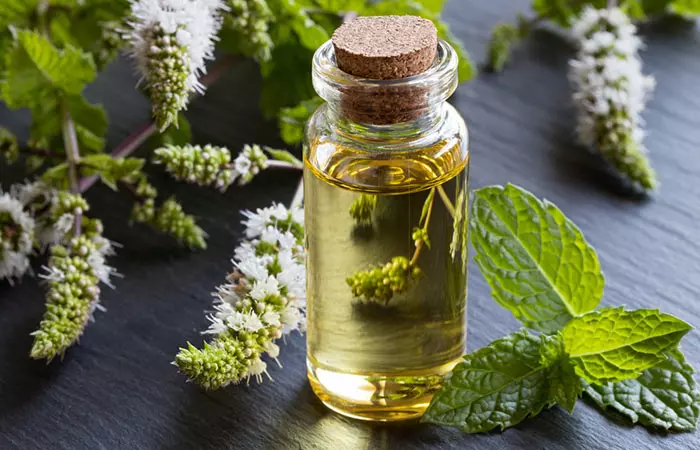
Peppermint oil was found to improve abdominal symptoms in patients with IBS (Irritable Bowel Syndromei A range of digestion-related symptoms, such as diarrhea, constipation, and stomach pain, primarily brought on by an intestinal issue. ) (3). It also showed promise in relieving symptoms like abdominal pain and discomfort, bloating, passage of gas, etc. (4).
You Will Need
- 1 drop of food-grade peppermint oil
- 1 glass of water
What You Have To Do
- Add a drop of food-grade peppermint oil to a glass of water.
- Mix well and consume.
How Often You Should Do This
You may drink this mixture 1-2 times daily.
On the other hand, Lara, a blogger plagued by bloating, found solace in peppermint tea. She confessed in her blog, “Peppermint tea. My best friend! Honestly, I don’t know what I’d do without it (i).” Lara, converted from disliking its scent to drinking 2-3 cups daily. She shared, “When I find myself with that full feeling and see my abdomen start to grow, I find a cup of peppermint tea helps ease the discomfort and pain that’s associated with bloating.”
 Quick Tip
Quick Tip2. Lemon
Lemons are rich in ascorbic acid (vitamin C). The vitamin C in lemons imparts anti-inflammatory and antioxidative properties that can help treat gastric issues (5), (6).
Although lemon juice is acidic, it alkalizes the stomach environment and maintains overall pH balance when mixed with water.
You Will Need
- ½ lemon
- 1 glass of water
What You Have To Do
- Squeeze out the juice from half a lemon into a glass of water.
- Mix well and drink the mixture.
How Often You Should Do This
You may do this 1-2 times daily.
3. Yogurt
Regular consumption of probiotic yogurt promotes the growth of healthy bacteria in the gut.
This can help in dealing better with gastrointestinal issues (7).
You Will Need
1 small bowl of yogurt
What You Have To Do
- Consume a small portion of yogurt daily with your meals.
- You may also substitute yogurt with buttermilk.
How Often You Should Do This
You can consume yogurt once daily.
4. Carom Seeds (Ajwain)
Carom seeds can help increase gastric acid secretion time and the amount of gastric acid (8). They possess carminativei An ingredient or medication designed to stop gas production in the digestive system or speed up gas ejection. and antispasmodic properties that can help in relieving gastric problems like flatulence and bloating (9).
You Will Need
½ teaspoon of carom seeds
What You Have To Do
Consume half a teaspoon of carom seeds after every meal.
How Often You Should Do This
You may do this 1-3 times daily.
5. Cumin (Jeera) Water
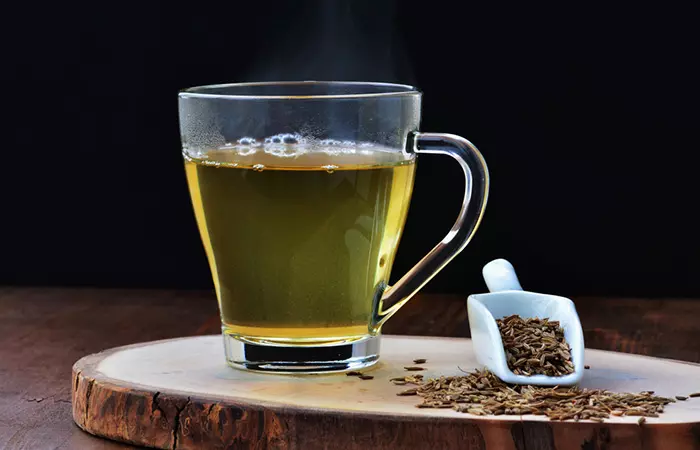
Cumin seeds have carminative and antispasmodic effects. They inhibit the contraction of smooth muscles of the gastric mucosa, a process that relaxes your gastrointestinal tract (GI tract) (10). This improves digestion by increasing the release of digestive juices, thus easing gastric issues.
You Will Need
- 1-2 teaspoons of cumin seeds
- 1 glass of water
What You Have To Do
- Add one to two teaspoons of cumin seeds to a glass of water and bring it to a boil.
- Switch off the stove and allow the solution to cool down.
- Drink it after every meal.
How Often You Should Do This
You may do this 2-3 times daily.
 Quick Tip
Quick Tip6. Asafoetida
Asafoetida supports digestion by enhancing the activity of your salivary glands and promoting the secretion of gastric, salivary, and pancreatic juices in your GI tract. These actions can help in managing symptoms like bloating, flatulence, and heartburn (11).
You Will Need
- A pinch of asafoetida
- 1 glass of water
What You Have To Do
- Add a pinch of asafoetida to a glass of water and mix well.
- Drink the mixture.
How Often You Should Do This
You may do this 1-2 times daily.
7. Fresh Ginger
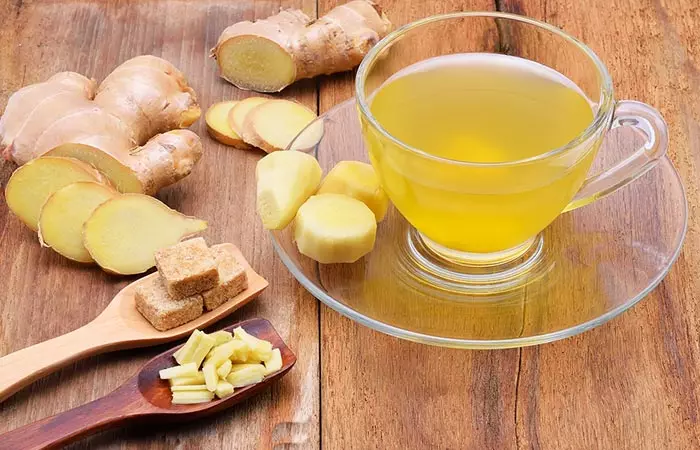
Ginger exhibits gastroprotective effects and has shown to treat various gastric problems like belching, bloating, dyspepsiai Upper abdominal irritation, also referred to as indigestion, characterized by bloating, heartburn, nausea, or acid reflux. , indigestion, nausea, and vomiting (12).
You Will Need
- An inch of sliced ginger
- 1 cup of water
What You Have To Do
- Add an inch of sliced ginger to a cup of water.
- Bring it to a boil in a saucepan and simmer for 5 minutes.
- Strain and allow the ginger tea to cool.
- Drink the tea.
- Alternatively, you can also chew on a small piece of fresh ginger.
How Often You Should Do This
You may do this 2 times daily.
8. Aloe Vera Juice
Aloe vera possesses gastroprotective properties that inhibit the secretion of gastric acid (13). Aloe vera juice, in combination with probiotic lactobacillus strains, can help in relieving gastrointestinal disorders (14).
You Will Need
2 tablespoons of fresh aloe juice
What You Have To Do
Consume two tablespoons of fresh aloe juice daily.
How Often You Should Do This
You may do this once daily for a week.
Caution: Do not opt for this remedy if you are pregnant as oral consumption of aloe can stimulate uterine contractions.
9. Yarrow
Yarrow exhibits antispasmodic properties (15). These properties can help relax your intestinal muscles, thereby alleviating the symptoms of gastrointestinal issues like diarrhea and gastritis. Yarrow extracts can protect the gastric mucosa against bacteria and stomach acids (16).
You Will Need
- 1 teaspoon of dried yarrow tea
- 1 cup of water
What You Have To Do
- Add a teaspoon of dried yarrow tea to a cup of water.
- Bring it to a boil in a saucepan and simmer.
- Strain the tea and allow it to cool down a little.
- Drink up.
How Often You Should Do This
You can do this 2-3 times daily.
10. Licorice
Licorice is associated with an increase in gastric mucosal defensive factors that can help in the treatment and prevention of gastric disorders like stomach ulcers (17). The glycyrrhizic acid in licorice shows anti-H. pylori (bacteria responsible for gastric ulcer) activity (18).
You Will Need
- 1 teaspoon of licorice root
- 1 cup of water
What You Have To Do
- Add a teaspoon of licorice to a cup of hot water.
- Steep for 5-7 minutes and strain.
- Drink the freshly prepared licorice tea.
How Often You Should Do This
You may do this 2 times daily.
Note: If you have hypertension or are pregnant or breastfeeding, avoid licorice. Also, do not overconsume licorice as it may lead to hypokalemia, high blood pressure, and arrhythmia.
11. Coconut Water
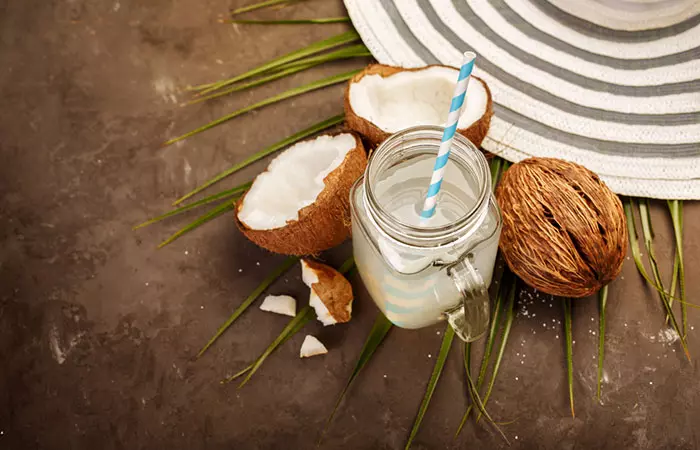
Coconut water exhibits gastroprotective activities by reducing the inflammation of the intestinal lining and enhancing the activity of the intestinal mucosal cells (19). Hence, it can help reduce bloating and gas.
You Will Need
1 glass of fresh coconut water
What You Have To Do
Consume a glass of fresh coconut water daily.
How Often You Should Do This
You may do this once daily.
12. Cinnamon
Cinnamon has anti-inflammatory, anti-spasmodic, and gastroprotective properties. Hence, it can help in treating digestive and stomach issues (20).
You Will Need
½ teaspoon of cinnamon powder
What You Have To Do
- Add half a teaspoon of cinnamon powder to your favorite dish and consume.
- You can also take cinnamon powder with a glass of water or juice with a teaspoon of honey.
13. Chamomile Tea
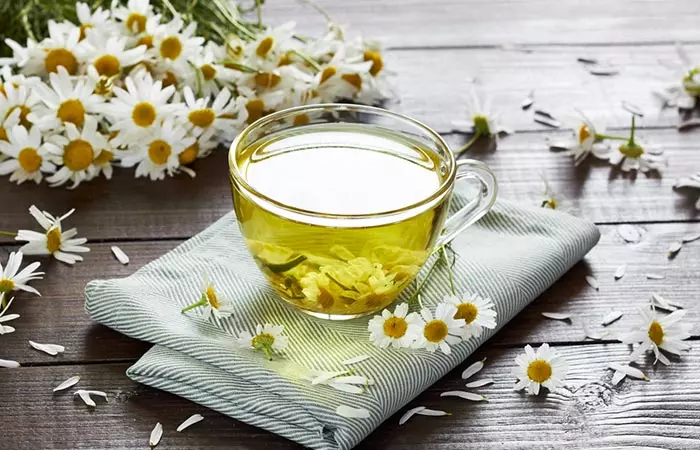
Chamomile not only reduces your stress levels but also improves digestion. It can help expel gas, relax gastric muscles, and improve digestion (21).
You Will Need
- 1 chamomile tea bag
- 1 cup hot water
What You Need To Do
- Steep the tea bag in a cup of hot water for 10 minutes.
- Sip on this hot herbal tea.
How Often You Need To Do This
Drink 2-3 cups in a day.
14. Pomegranate
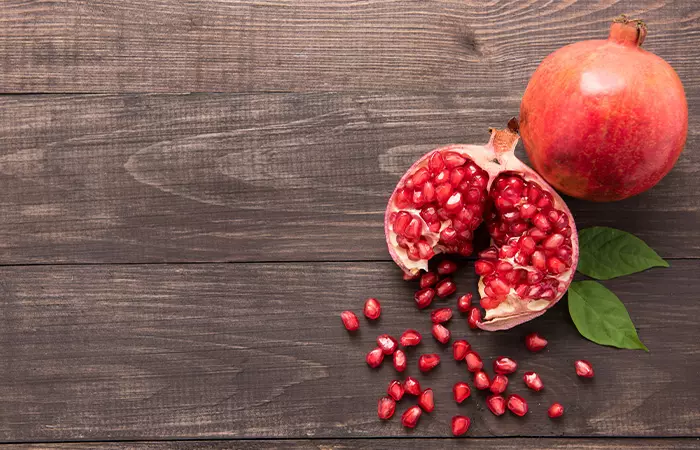
Pomegranate has prebiotic properties that may help promote the good bacteria in the gut (22). This may promote digestion and help reduce gas and bloating.
You Will Need
- 1 ripe pomegranate
- ½ cup of water
- 1 teaspoon of organic honey (optional)
- A pinch of salt (optional)
- 1 teaspoon of lemon juice (optional)
What You Have To Do
1. Cut a pomegranate in half and place each half in a large bowl with the cut side facing down.
2. Tap the back with a spoon to release the seeds.
3. Add these seeds to a food processor with water and blend.
4. Sieve the juice using a mesh strainer or a cheesecloth.
5. Add honey, a pinch of salt, and lemon juice for enhanced flavor.
6. Pour the juice into a tumbler and enjoy.
Note: While simethicone, activated charcoal, and antacids are commonly used over-the-counter gas medications, it’s crucial to take a responsible and proactive approach to your health. Always consult a healthcare provider if you have any ongoing gas problems or before starting to use medication.
Commonly used spices such as caraway, anise, cardamom, and turmeric have all been traditionally used to alleviate digestive issues. A teaspoon of baking soda in water can neutralize stomach acid. It is a quick DIY antacid, but it has to be taken with care (23). While these home remedies can help you deal with gastric issues, you must also make a few changes to your lifestyle to prevent the recurrence of these issues. Listed below are a few tips that can help you.
Tips To Prevent Excessive Gas
Although flatulence is a natural gastrointestinal function, a case of excessive gas can be embarrassing and worrisome. So, if you want to know how to stop farting, it’s important to focus on the root causes, such as diet and digestion. Here are some solutions to ease gas and bloating:
- Eat slowly and chew your food properly while eating.
- The human body takes time to digest fried and fatty foods. It is strenuous for the digestive system and may lead to the trapping of gas in the gut (24).
- Spicy food can irritate the lining of the gastrointestinal tract, causing gas, bloating, and even diarrhea.
- Avoid chewing gum regularly.
- Avoid using straws while drinking fluids as they can cause you to swallow more gas.
- Avoid drinking carbonated drinks as they can lead to the formation of excessive gas in the intestines.
- Exercise regularly.
- Quit smoking.
- Limit your alcohol intake.
- Avoid consuming foods that are difficult to digest.
- Steer clear of foods that produce gas, such as beans, lentils, cruciferous vegetables (like broccoli and cauliflower), dairy products, and processed foods high in sugar substitutes.
- Stay hydrated.
- Avoid lying down right after a meal.
- Take a warm bath or use a heating bag to relieve pain from excessive gas.
- Follow a BRAT diet until you recover completely from your gastric troubles. BRAT stands for bananas, rice, applesauce, and toast. All these foods are easy on your stomach as they can be easily digested.
Use these tips in combination with any of the remedies provided above to find relief from recurring gastric issues. However, if you develop any of the following symptoms, it is best to consult a doctor for further assistance.
When To See A Doctor
Most cases of gastrointestinal issues, like gas, are short-lived and do not require medical attention. However, if your condition persists and results in sleeplessness, loss of appetite, or interferes in any way with your day-to-day life, it is best to consult a doctor immediately.
Infographic: 7 Easy DIY Ways To Relieve Gas
Gas and bloating cause discomfort and can happen to anyone at any time. Taking medicines might help, but it doesn’t hurt to try out some natural remedies that might end up assisting you in the long run. We have listed some of the easiest home remedies that may help relieve gas in the infographic below. Check it out!
Some thing wrong with infographic shortcode. please verify shortcode syntaxBloating, belching and flatulence may be caused by heavy meals, a lack of exercise, improper excretion and gas transit, certain medications, or underlying conditions. If you experience gassiness and bloating regularly, you may be suffering from gastric problems. Home remedies like lemon juice, carrom seeds, cumin water, yogurt, and coconut water may help alleviate stomach gas and aid the digestive process. You may also drink chamomile tea or fresh ginger tea to help relieve flatulence. While temporary and easily resolvable gassiness does not require medical attention, if the condition persists or occurs too frequently, you should seek medical guidance.
Watch this video to learn natural ways to get rid of bloating quickly and easily! Discover simple tips to ease your discomfort and feel better fast.
Frequently Asked Questions
Do eggs cause gas?
Some individuals may be intolerant to eggs, which may lead to increased gas and indigestion upon their consumption.
Do almonds cause gas?
Almonds are high in fat. Thus, eating too many of them may lead to gas and bloating as they take more time to be digested. Always drink a glass of water after you munch on almonds. It is always better to soak almonds overnight to reduce gas formation.
Where do you feel gas pain?
Pain from excessive gas in the abdomen results in sharp pain in the left side of the colon. If you feel any epigastric pain, check with your doctor for gastritis.
How long can pain from trapped gas last?
Most often than not, gas pain doesn’t last more than 45 minutes to an hour. In rare instances, gas pain may last up to 48 hours in some individuals. It is best to consult a doctor in such cases to rule out the possibility of a heart attack.
How to remove gas from the stomach instantly with home remedies?
Apart from the remedies mentioned above, you can perform yoga poses like Pawanmuktasana, Balasana, Apanasana, to get relief from gas. You can also massage the painful area in a downward motion to remove gas. Anecdotal evidence suggests that drinking a glass of water with 1 tablespoon of apple cider vinegar may also help expel the gas.
What foods cause trapped gas in the stomach?
Gas and bloating are frequently related to the malabsorption and maldigestion of simple and complex carbohydrates and dietary fibers (25). This can include dairy products, whole grains, onions, garlic, bananas, brussel sprouts, and carrots.
Does green tea help with gas?
Yes, natural antioxidants like catechins found in green tea have anti-inflammatory and anti-bacterial properties that may help reduce the risk of cholesterol absorption in the gastrointestinal tract and prevent gastrointestinal illness (26).
Illustration: Home Remedies For Gas And Bloating That Provide Relief

Image: Stable Diffusion/StyleCraze Design Team
Personal Experience: Source
StyleCraze's articles are interwoven with authentic personal narratives that provide depth and resonance to our content. Below are the sources of the personal accounts referenced in this article.
i. The bloat is back!!!https://notjustibs.wordpress.com/tag/bloating/
References
Articles on StyleCraze are backed by verified information from peer-reviewed and academic research papers, reputed organizations, research institutions, and medical associations to ensure accuracy and relevance. Read our editorial policy to learn more.
- Gastritis, Medline Plus, US National Library of Medicine, National Institutes of Health.
https://medlineplus.gov/ency/article/001150.htm - Pathophysiology, Evaluation, and Treatment of Bloating, Gastroenterology & Hepatology, US National Library of Medicine, National Institutes of Health.
https://www.ncbi.nlm.nih.gov/pmc/articles/PMC3264926/ - Peppermint oil (Mintoil) in the treatment of irritable bowel syndrome: a prospective double blind placebo-controlled randomized trial. Digestive and Liver Disease, US National Library of Medicine, National Institutes of Health.
https://pubmed.ncbi.nlm.nih.gov/17420159/ - A Novel Delivery System of Peppermint Oil Is an Effective Therapy for Irritable Bowel Syndrome Symptoms, Digestive Diseases and Sciences, US National Library of Medicine, National Institutes of Health.
https://www.ncbi.nlm.nih.gov/pmc/articles/PMC4729798/ - Vitamin C, Gastritis, and Gastric Disease: a historical review and update, Digestive Diseases and Sciences, US National Library of Medicine, National Institutes of Health.
https://www.ncbi.nlm.nih.gov/pmc/articles/PMC3874117/ - Citrus fruits as a treasure trove of active natural metabolites that potentially provide benefits for human health, Chemistry Central Journal, US National Library of Medicine, National Institutes of Health.
https://www.ncbi.nlm.nih.gov/pmc/articles/PMC4690266/ - Yogurt and gut function, The American Journal of Clinical Nutrition, Oxford University Press.
https://academic.oup.com/ajcn/article/80/2/245/4690304 - Carum copticum L.: A Herbal Medicine with Various Pharmacological Effects, Biomed Research International, US National Library of Medicine, National Institutes of Health.
https://www.ncbi.nlm.nih.gov/pmc/articles/PMC4096002/ - Prevention and Treatment of Flatulence From a Traditional Persian Medicine Perspective, Iranian Red Crescent Medical Journal, US National Library of Medicine, National Institutes of Health.
https://www.ncbi.nlm.nih.gov/pmc/articles/PMC4893422/ - Cuminum cyminum and Carum carvi: An update, Pharmacognosy Review, US National Library of Medicine, National Institutes of Health.
https://www.ncbi.nlm.nih.gov/pmc/articles/PMC3210012/ - Biological activities and medicinal properties of Asafoetida: A review, Journal of Traditional and Complementary Medicine, US National Library of Medicine, National Institutes of Health.
https://www.ncbi.nlm.nih.gov/pmc/articles/PMC5506628/ - A review of the gastroprotective effects of ginger (Zingiber officinale Roscoe). Food & Function, US National Library of Medicine, National Institutes of Health.
https://pubmed.ncbi.nlm.nih.gov/23612703/ - The effects of aqueous extract of Aloe vera leaves on the gastric acid secretion and brain and intestinal water content following acetic acid- induced gastric ulcer in male rats, Avicenna Journal of Phytomedicine, US National Library of Medicine, National Institutes of Health.
https://www.ncbi.nlm.nih.gov/pmc/articles/PMC4103709/ - Effect of Aloe vera juice on growth and activities of Lactobacilli in-vitro. Acta bio-medica: Atenei Parmensis, US National Library of Medicine, National Institutes of Health.
https://pubmed.ncbi.nlm.nih.gov/23762993/ - Antispasmodic Effects of Yarrow (Achillea Millefolium L.) Extract in the Isolated Ileum of Rat, African Journal of Traditional, Complementary, and Alternative medicines, US National Library of Medicine, National Institutes of Health.
https://www.ncbi.nlm.nih.gov/pmc/articles/PMC3847392/ - A review on phytochemistry and medicinal properties of the genus Achillea, DARU Journal of Pharmaceutical Sciences, US National Library of Medicine, National Institutes of Health.
https://www.ncbi.nlm.nih.gov/pmc/articles/PMC3232110/ - Antiulcer properties of Glycyrrhiza glabra L. extract on experimental models of gastric ulcer in mice, Iranian Journal of Pharmaceutical Research, US National Library of Medicine, National Institutes of Health.
https://www.ncbi.nlm.nih.gov/pmc/articles/PMC4673944/ - The healing effect of licorice (Glycyrrhiza glabra) on Helicobacter pylori infected peptic ulcers, Journal of Research in Medical Sciences, US National Library of Medicine, National Institutes of Health.
https://www.ncbi.nlm.nih.gov/pmc/articles/PMC3818629/ - Gastroprotective and mucosa homeostatic activities of coconut milk and water on experimentally induced gastropathies in male wistar rats. Tissue & Cell, US National Library of Medicine, National Institutes of Health.
https://pubmed.ncbi.nlm.nih.gov/28844402/ - Gastroprotective, cytoprotective and antioxidant effects of Oleum cinnamomi on ethanol induced damage, Cytotechnology, US National Library of Medicine, National Institutes of Health.
https://www.ncbi.nlm.nih.gov/pmc/articles/PMC3973792/ - Chamomile: A herbal medicine of the past with bright future, Mol Med Report, US National Library of Medicine, National Institutes of Health.
https://www.ncbi.nlm.nih.gov/pmc/articles/PMC2995283/ - Food Applications and Potential Health Benefits of Pomegranate and its Derivatives, Foods Journal, US National Library of Medicine, National Institutes of Health.
https://www.ncbi.nlm.nih.gov/pmc/articles/PMC7074153/ - Baking Soda Can Settle the Stomach but Upset the Heart: Case Files of the Medical Toxicology Fellowship at the University of California, San Francisco
https://www.ncbi.nlm.nih.gov/pmc/articles/PMC2995283/ - Prevention and Treatment of Flatulence From a Traditional Persian Medicine Perspective
https://www.ncbi.nlm.nih.gov/pmc/articles/PMC4893422/ - Gas and Bloating Gastroenterology and Hepatology US National Library of Medicine.
https://www.ncbi.nlm.nih.gov/pmc/articles/PMC5350578/ - Pharmacological effects of green tea on the gastrointestinal system European Journal of Pharmacology Pubmed
https://pubmed.ncbi.nlm.nih.gov/15464031/
Read full bio of Madhu Sharma
Read full bio of Priyanka Sadhukhan
Read full bio of Arshiya Syeda
Read full bio of Moksha Gandhi












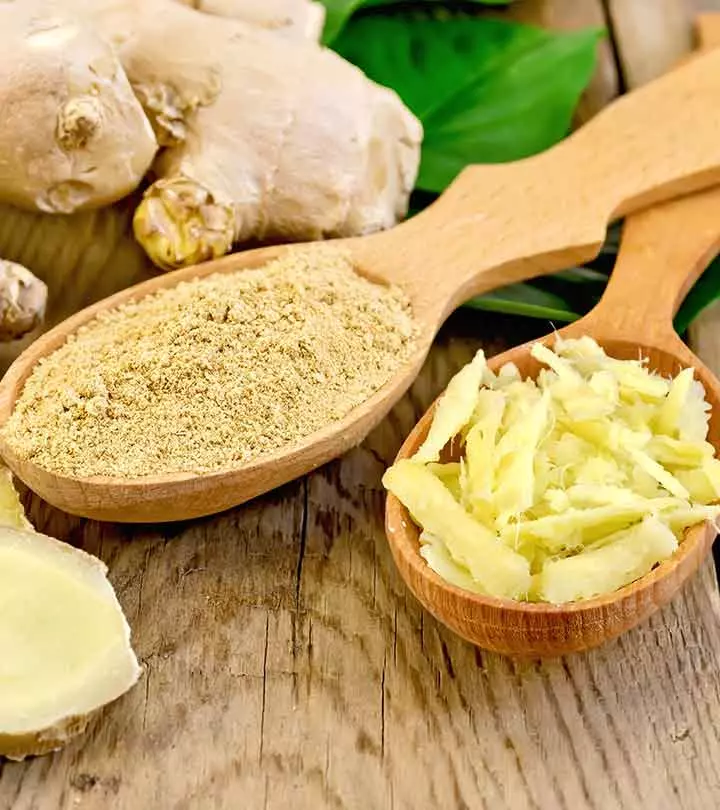









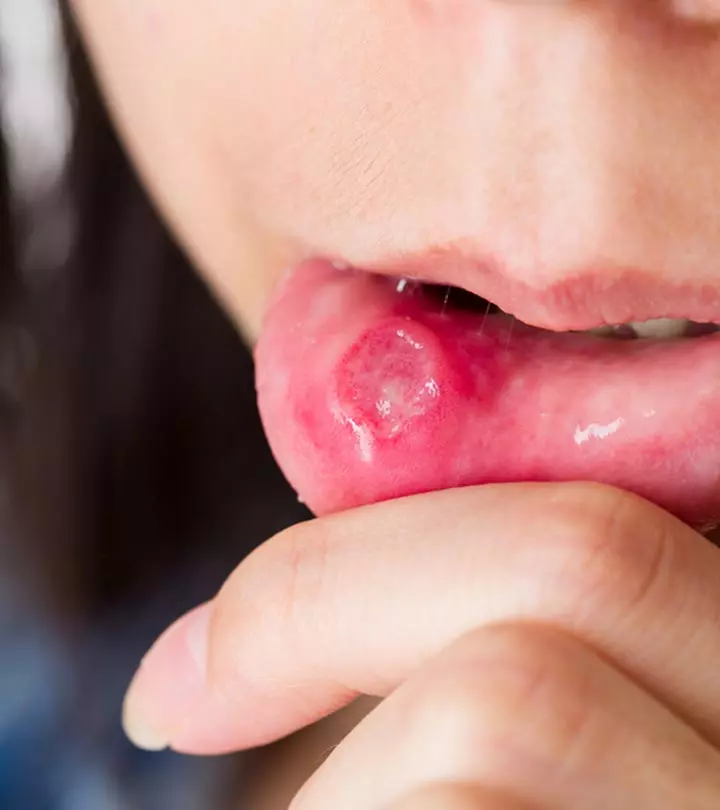




Community Experiences
Join the conversation and become a part of our empowering community! Share your stories, experiences, and insights to connect with other beauty, lifestyle, and health enthusiasts.